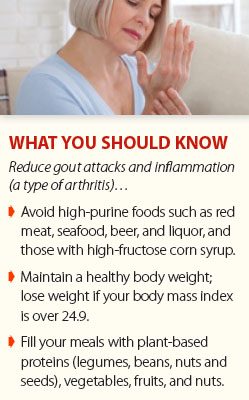Reduce Inflammation with Phytochemicals
In your body, inflammation can cause redness, heat, swelling, pain, and loss of function (i.e., being unable to smell during a cold, or unable to move a joint due to swelling). Severe inflammation may cause fever or cause you to feel ill or fatigued. Some inflammation is helpful to prevent further injury as well as boost your healing response. However, too much or chronic inflammation can significantly worsen your overall health.
Inflammation can be caused by germs (bacteria, viruses or fungi), external injuries like scrapes or cuts, effects of chemicals or radiation (smoking, pollution), alcohol consumption, excess calorie intake, and consuming foods such as trans fats, fried foods, processed sugar, and saturated fats (red meat, butter).
“The best foods for reducing inflammation are those rich in phytochemicals,” says Stefania Mascioli, a clinical dietitian nutritionist at NewYork-Presbyterian Hospital/Weill Cornell.
Foods with Phytochemicals
“Phytochemicals are natural compounds primarily found in fruits, vegetables, whole grains, legumes, and spices,” Mascioli says.
Phytochemicals have an antioxidant effect—they reduce cell damage caused by free radicals (a byproduct of normal cell function; they also can increase due to stress, environmental pollution, diet, and lifestyle choices). Too many free radicals can cause damage and inflammation.

There is no recommended intake for phytochemicals. However, Mascioli states, “the encourages the intake of 2½ cups of vegetables per day, as well as 2 cups of fruit. Vary your list with a variety of colors to reap the benefits of phytochemicals.”
The most well-known phytochemicals are flavonoids. “Flavonoids are responsible for brilliant colors,” says Mascioli. “Berries, red grapes, soybeans, tea, cocoa, onions, kale, broccoli, and Brussels sprouts are just a few foods naturally rich in flavonoids.” Aim to fill half your plate with vegetables at lunch and dinner, and include fruits as snacks or desserts to increase your intake.
Omega-3 Fatty Acids
Omega-3 fatty acids are another component of foods known to reduce inflammation caused by diseases. According to Mascioli, “Diets rich in omega-3 fatty acids, particularly eicosapentaenoic acid (EPA) and docosahexaenoic acid (DHA), may help to reduce inflammation in the joints and improve the symptoms of rheumatoid arthritis.” Great sources of omega-3s include cold-water fatty fish such as mackerel, salmon, and sardines, seeds such as flax, chia, and hemp, and plant oils like olive or avocado.
“Chia seeds, hemp seeds or ground flaxseeds (which are not consumable unless ground) are a great addition to breakfast smoothies or yogurts,” Mascioli says. “Spread avocado or almond butter over whole-grain toast instead of butter. Lastly, ditch creamy salad dressing and opt for an olive oil‑based vinaigrette.”
The post Reduce Inflammation with Phytochemicals appeared first on University Health News.
Read Original Article: Reduce Inflammation with Phytochemicals »


